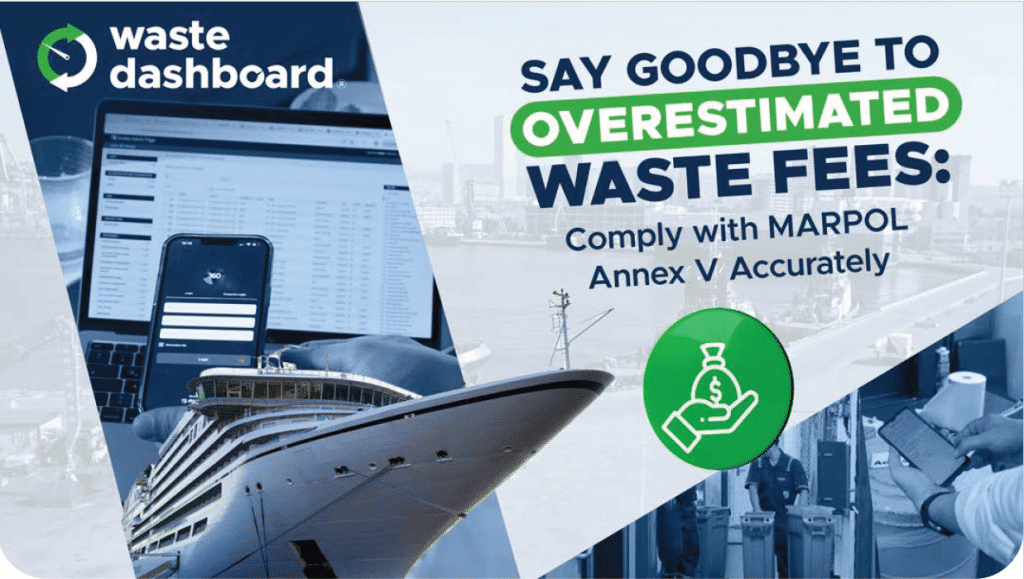Waste & material traceability solution for sustainable facilities

The maritime industry is the lifeline of global trade, carrying more than 80% of goods worldwide. But with this scale comes a pressing environmental challenge: ship-generated waste. Maritime waste management is crucial, as every vessel produces a diverse range of waste streams, from plastics and oily rags to food residues and cargo leftovers. Unlike land-based systems, where municipal or commercial operators handle disposal, ships must take full responsibility for storing, treating, and discharging their waste in accordance with international law.
This responsibility is not just technical—it is also logistical and reputational. Ships operate across multiple jurisdictions, encounter varying port reception facilities, and often face limitations in onboard storage capacity during long voyages. Without robust systems for monitoring and documenting waste flows, operators run the risk of non-compliance, penalties, and reputational damage. At the same time, the improper discharge of waste can have irreversible impacts on fragile marine ecosystems.
Recognizing the threat that unmanaged ship waste poses to marine ecosystems, the International Maritime Organization (IMO) introduced the International Convention for the Prevention of Pollution from Ships, better known as MARPOL. Among its six annexes, Annex V specifically addresses garbage management, setting a global baseline for how ships must collect, store, and discharge waste.
Annex V outlines strict rules: plastics can never be discharged into the sea; other categories of waste, such as food residues, cargo leftovers, or cleaning agents, are subject to highly specific conditions based on distance from land, water depth, and whether the ship is operating in a “special area.” These rules aim to protect sensitive marine zones from pollution while recognizing the practical realities of life at sea.
But MARPOL Annex V is not only about what ships cannot do. It also requires ships to put in place formal waste management systems:
For crews already burdened with operational tasks, maintaining accurate records manually is not just time-consuming but also prone to error. A misplaced entry or missing certificate can have serious consequences during inspections. Compliance is non-negotiable: violations can result in heavy fines, detentions, or reputational damage that may jeopardize contracts and port access.
For maritime operators, waste tracking is no longer a background task—it is the linchpin of compliance, safety, and environmental accountability. The days when waste logs could be updated on paper alone are over. In an era of heightened regulatory scrutiny and ESG transparency, comprehensive traceability is essential.
Accurate tracking ensures that every waste stream is accounted for, from generation onboard to discharge at port reception facilities. It provides documented proof for inspectors, reduces the likelihood of illegal discharges, and creates confidence among regulators and stakeholders. But the benefits of waste tracking go beyond compliance:
In short, waste tracking transforms waste management from a compliance burden into a strategic opportunity.
The maritime industry operates under a unique spotlight. On one hand, it is indispensable to global trade; on the other, it is increasingly held accountable for its environmental footprint. Public awareness of ocean pollution—especially plastics—has never been higher. NGOs, regulators, and the public demand that shipping companies operate with greater transparency and responsibility.
Meanwhile, investors and customers are embedding environmental, social, and governance (ESG) criteria into their decision-making. Maritime companies that demonstrate strong environmental performance enjoy access to sustainable financing, better insurance terms, and enhanced reputations. Conversely, those that fall short risk financial penalties, reduced competitiveness, and reputational harm.
MARPOL Annex V compliance is therefore more than an operational requirement—it is a business imperative. Operators must be able to prove, with audit-ready data, that they are handling waste responsibly.

This is where Evreka’s WasteDashboard steps in as a transformative solution. Instead of relying on manual logbooks or fragmented spreadsheets, maritime operators can use WasteDashboard to consolidate all waste data across fleets, voyages, and facilities into a single, interactive platform.
With WasteDashboard, operators can:
By digitizing compliance, WasteDashboard helps companies move beyond basic regulatory obligations to strategic sustainability leadership.
As global trade expands, the volume of ship-generated waste will only increase. Relying on manual processes or fragmented systems is no longer enough. MARPOL Annex V sets the baseline for compliance, but the real differentiator will be digital traceability and transparent reporting.
WasteDashboard positions maritime operators to navigate this future with confidence. By providing real-time visibility, audit-ready documentation, and ESG integration, it transforms waste management from a reactive necessity into a proactive strategy. Operators that embrace this approach not only avoid fines and detentions but also demonstrate leadership in sustainability, building trust with regulators, investors, and the public.
In a sector often criticized for its environmental impact, adopting digital waste tracking is not just about compliance—it is about securing a license to operate in the future economy.
For a deeper dive into regulatory requirements, compliance strategies, and the role of digital solutions in the maritime industry, Download our free eBook:“ Navigating MARPOL Annex V – The Ultimate Guide to Onboard Waste Management“.
Request a demo to discover how Evreka’s WasteDashboard transforms maritime waste data into powerful ESG insights—helping your fleet achieve MARPOL Annex V compliance, strengthen traceability, and turn sustainability into a competitive advantage.